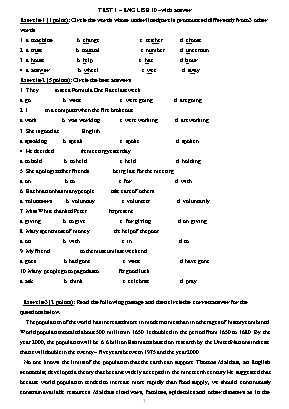Đề kiểm tra môn Tiếng Anh Lớp 10 (Có đáp án)
Bạn đang xem tài liệu "Đề kiểm tra môn Tiếng Anh Lớp 10 (Có đáp án)", để tải tài liệu gốc về máy bạn click vào nút DOWNLOAD ở trên

TEST 1 – ENGLISH 10 –with answer Exercise 1 (1 point): Circle the words whose underlined part is pronounced differently from 3 other words 1. a. machine b. change c. teacher d. choose 2. a. trust b. mutual c. number d. uncertain 3. a. house b. help c. hat d. hour 4. a. answer b. wheel c. wet d. away Exercise 2 (5 points): Circle the best answers 1. They ..to see a Formula One Race last week. a. go b. went c. were going d. are going 2. I ..on a computer when the fire broke out. a. work b. was working c. were working d. are working 3. She is good at ..English. a. speaking b. speak c. spoke d. spoken 4. He decided..the meeting yesterday. a. to hold b. to held c. held d. holding 5. She apologized her friends being late for the meeting. a. on b. to c. for d. with 6. Each nation has many people ..take care of others. a. volunteers b. voluntary c. volunteer d. voluntarily 7. Miss White thanked Peter..her present. a. giving b. to give c. for giving d. on giving 8. Mary spent most of money the help of the poor. a. on b. with c. in d. to 9. My friend to the museum last weekend. a. goes b. had gone c. went d. have gone 10. Many people go to pagodas to.for good luck. a. ask b. think c. celebrate d. pray Exercise 3 (2 points): Read the following passage and then circle the correct answer for the questions below. The population of the world has increased more in modern times than in other ages of history combined. World population totaled about 500 million in 1650. It doubled in the period from 1650 to 1680. By the year 2000, the population will be 6.6 billion. Estimates based on research by the United Nations indicate that it will double in the twenty – five years between 1975 and the year 2000. No one knows the limits of the population that the earth can support. Thomas Malthus, an English economist, developed a theory that became widely accepted in the nineteenth century. He suggested that because world population tended to increase more rapidly than food supply, we should continuously constrain available resources. Malthus cited wars, famines, epidemics and other disasters as in the usual limitations of world population growth. With recent advances in science and technology, including improved agricultural methods and great processes and in medicine, some of the limiting factors in population growth have been lessened, with obvious results. International organizations have recommended programmes to encourage general economic development that target areas along with a decrease in birth rates to effect a lasting solution. * Questions: 1. Which of the options below is the best title (chủ đề) for the passage? a. A brief History of Population and Over-population. b. Limiting Factors in Population Growth. c. The United Nation’s Estimate. d. Thomas Malthus’s Theory. 2. What is the population from the estimates based on research by the US? a. 2 billion b. 5 billion c. 7 billion d. over 6 billion 3. Who was Thomas Malthus? a. A scientist c. A doctor of medicine b. An economist d. A United Nation’s representative 4. According to the passage, the limiting factors in population growth have been lessened because of.. a. precaution b. disasters c. improved technology d. scarcity Exercise 4 (2 points): Choose the underlined word or phrase in each sentence that needs correcting 1. Jane advised Andrew look for a new job a b c d 2. Mike thanked me for invite him to my birthday party. a b c d 3. I am delighted hearing the news. a b c d 4. Why didn’t your girlfriend and you came to my party last night? a b c d
Tài liệu đính kèm:
 de_kiem_tra_mon_tieng_anh_lop_10_co_dap_an.doc
de_kiem_tra_mon_tieng_anh_lop_10_co_dap_an.doc





